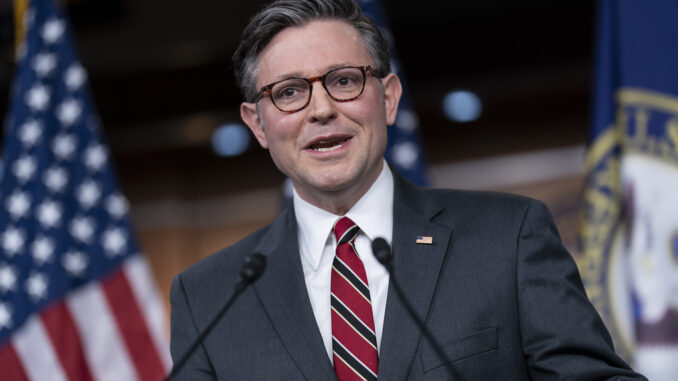
WASHINGTON, D.C. — When Ukrainian President Volodymyr Zelenskyy spoke with congressional leaders in Washington late last year he told them privately what is now public: With U.S. weapons, they could win the war against Russia, but without them Russian President Vladimir Putin would be victorious.
In a subsequent meeting with new House Speaker Mike Johnson, a looming deadline for the supplies came into focus.
Now, with U.S. aid for Ukraine teetering in Congress, it’s up to Johnson to decide what happens next.
President Joe Biden said he told Zelenskyy in a Saturday phone call after Ukraine announced it was withdrawing troops from the eastern city of Avdiivka that he remained confident that the U.S. funding would eventually come through. But asked in an exchange with reporters if he was confident whether a deal could be made before Ukraine loses more territory to Russian, Biden responded, “I’m not.”
“Look Ukrainians have fought so bravely,” he said. “There is so much on the line. The idea now when they are running out of ammunition that we’re going to walk away. I find it absurd.”
Zelenskyy said at a news conference with Vice President Kamala Harris in Germany that Ukraine was counting on a “positive decision” from Congress for the “vital” aid from its “strategic partner.” Earlier at a security conference in Munich, he warned of an “artificial deficit” of arms for his country.
The political and policy decisions ahead in Congress are gravely uncertain. Johnson is insisting he won’t be “rushed” into approving the $95.3 billion foreign aid package from the Senate, despite overwhelming support from most Democrats and almost half the Republicans. But he has yet to chart a path forward in his chamber.
While many in Congress view Putin as a global threat, particularly after Russia intervened in the 2016 election in favor of Donald Trump, Johnson’s colleagues on the far right are increasingly ambivalent about Putin’s aggression and authoritarian leadership, as seen in conservative Tucker Carlson’s admiring videos from Moscow after his recent interview with the Russian leader.
“As Congress debates the best path forward to support Ukraine, the United States, and our partners, must be using every means available to cut off Putin’s ability to fund his unprovoked war in Ukraine and aggression against the Baltic states,” Johnson, R-La., said in a statement.
If the $95 billion aid package was put to a vote, Johnson would find overwhelming support in the House from a coalition of Democrats and Republicans. Anchoring the package is $61 billion for Ukraine, mainly in the form of military equipment from the U.S. It also sends foreign assistance and humanitarian aid to Israel, Gaza and allies in the Indo-Pacific region, including Taiwan.
Biden and the Democratic congressional leaders are imploring the speaker to cast off his right wing and join forces with them to send a sweeping bipartisan message of U.S. leadership in supporting Ukraine and confirming the U.S. commitment to its allies around the world, especially as Trump criticizes the NATO alliance.
“House Republicans can either choose America’s national security interests or choose Vladimir Putin and Russia — that is not a difficult choice,” House Democratic leader Hakeem Jeffries said after speaking with Johnson midweek.
But for Johnson, eyeing his own political future, the choices are different. If he reaches across the aisle to Democrats for a partnership, he is likely to face immediate calls for his ouster. That’s what happened when the far right booted his predecessor, former GOP Rep. Kevin McCarthy, after he joined forces with Democrats to pass legislation last fall to keep the federal government from shutting down.
Democratic Rep. Chrissy Houlahan of Pennsylvania, an Air Force veteran who recently traveled to the Baltic region where National Guard troops from her state partnered with Lithuanian allies, said “it boggles my mind” that colleagues don’t understand the Russia threat.
When Johnson said the House will “work its will” rather than take up the Senate package, Houlahan said the House’s “will” is to vote for it.
“He knows better than this — that there are more than 300 of us who are willing to vote for this package,” she said.
“He is the speaker of the House,” she said. “He is not the speaker of the Republicans.”




